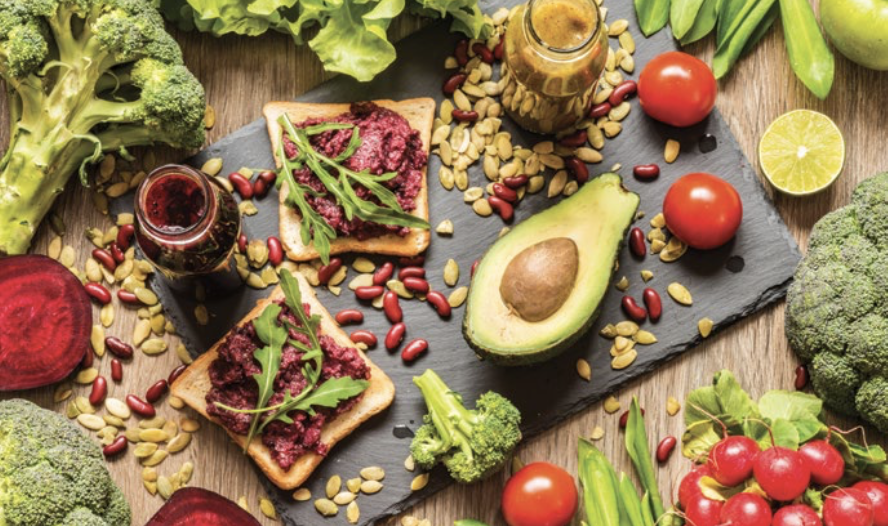In a society where cancel culture is rampant and everyday there is a new person being torn down for not being perfect enough, no one is safe, especially influencers.
Yvette Barnett explores the evolution of Veganism from a lifestyle choice to a target on your back; and why more and more people are shying away from the label because of the backlash and mental health effect it is having.

Vegans have always been the butt of jokes, most of which they take on the chin, but when did that cheeky attitude move towards such an emotionally charged, angry attack to the point that many influencers are too afraid to label themselves as ‘vegan’? Influencers become vegan for many different reasons; no lifestyle choice causes more attention and negativity than the ‘vegan’ label.
Vegans get attacked from people who find their choices insulting to their own values, but more problematically, they receive an onslaught of hate from their own peers, who hold them to an unattainable standard. Vegans put others down for not being ‘perfect’ or ‘good enough’.
Not only is this expectation detrimental to the vegan cause of compassion and sustainability, the backlash is also having considerable effects on the mental health of notable vegans to the point that more and more influencers are moving away from the vegan label and choosing to be ‘plant based’. Is this the way forward, the evolution of the movement or is it giving into bullying and letting the negativity win?
What is Veganism? Isn’t it just a fad diet?
In 2020, veganism is so much more than a diet. It has evolved so far from its early beginnings. Veganism is the practice of abstaining from the use of animal products. The practice can be traced to northern and western ancient India in 1300 BCE. However, the vegan diet became increasingly mainstream in the 2000s. The Economist declared 2019 “The year of the vegan”.
While maintaining its early values, it has evolved into an all compassing label that covers everything from what you eat, what you wear, to even what you clean your house with. The plant-based movement has taken the world by storm, with more people becoming vegan every day.
This change in lifestyle can sometimes lack variety or inspiration; this is where bloggers and influencers have exploded. This has led to everything from vegan make up bloggers, vegan mummy bloggers, vegan fashion bloggers, the list goes on. In 2020, to be vegan is not simply eating ‘plant based’, it means that you do not use any animal products in any area of life. The label vegan has also become a status symbol for many bloggers and Instragrammers, by creating an idealist and perfect lifestyle.
But what happens when you fall short for the new idealized status? The vegan trend has launched many vegan Influencers, and allowed them to build empires on the lifestyle choice.
Ella Woodward created her food blog Deliciously Ella in 2012 and in 2019 it has grown into a million pound brand. She has launched four best-selling books, a number one app, three delis and a further three food product lines across the UK. She is now a major brand in most health food stores.
Grace Beverley, formerly GracefitUK, began as a fitness Instagrammer in 2014. Since then she has adopted the vegan label, focusing on the sustainability message and, over the past two years, she has founded B_ND and TALA during her time at Oxford University.
Both multimillion dollar businesses look to bring an ethical and accessible side to the fitness industry. It is clear that incorporating the vegan label into your brand can be very lucrative, but what is the impact if you have to abandon that label?
Veganism weaponised.
Veganism, unlike many lifestyles, gets critiqued by both vegans and non- vegans alike. Meat eaters sling the usual insults “soy boy” or threaten to sneak meat into the vegan food. But the real hate comes from within the community. No one is faster to cancel a vegan influencer than the vegan community. Society has evolved to a level where we will always have a negative impact on nature, and no one will be faster to point it out than a self-righteous vegan.
Is faux leather a cruelty free alternative when it is made from plastic? There is an unrealistic standard that is becoming expected of influencers and bloggers, this is fueling the new ‘cancel culture’.
Bloggers are experiencing mass anxiety, just waiting to be cancelled for not reading a food label correctly or using the wrong dishwashing detergent. What is veganism under these new standards? It is never enough, there is always something to trigger backlash. Influencers are risking their careers for a lifestyle that could either boost their brand or destroy it.
As a result of this constant anxiety and backlash, the mental health impact on public figures and influences is severely detrimental. This anxiety and backlash can affect brands and businesses.
Zanna Van Dijk, a fitness Instagrammer and blogger and founder of ‘Stay Wild Swim’, a sustainable swimwear brand, has decided to ‘un- label’ herself as vegan and label herself as plant-based as she felt she couldn’t withstand the constant criticism. She said that although, while at home, she is 100% vegan, while travelling mistakes can be made and that was enough for her to dissociate from the label.
She has also posted about the fear of not being 100% sustainable. “Discussing this topic opens me up to criticism which is understandable – it comes with the territory. I am often told that I am not doing enough, that I am not setting a good example or that I am a hypocrite for talking about sustainability, but not being perfectly sustainable.”
The backlash that is caused when you fall short
What happens when you quit veganism but your brand is so ingrained into health and wellness? Vegan YouTuber Yovana Mendoza had garnered nearly two million subscribers for her raw vegan diet content, but had recently been spotted with a plate of fish and called out for her ostensible hypocrisy. Her followers were unsympathetic.
“You must change your name, LIEvana.” one commented. “You are asking others to follow a diet that almost killed you… Wow just wow!!” said another. Since then she has lost over 26,000 subscribers and her views are currently down 400%. YouTuber Kalel has admitted that she is no longer vegan, and has recently been eating meat and eggs.
This came as a huge shock to her audience as she used to be an outspoken vegan advocate, even working with animal rights charity PETA on a number of occasions. Since leaving veganism, her channel has suffered, she has lost 120,000 subscribers and is down 5 million views since the announcement.
These bloggers’ downfall was that their brand was so tied to their diet they alienated their audiences when they quit veganism. Not all is lost, it is possible to quit veganism and not alienate your audience. Sarah’s Day, an Australian health and fitness blogger has transitioned away from veganism and continued to see huge success on their channel. Sarah has always focused on health and fitness.
She tends to change her diet regularly and despite being everything from vegan, paleo, macro counting etc., she has never made it the core of her brand. She has never been preachy about her lifestyle. She constantly repeats “everyone is different, this is what works for me”. Despite what works for her constantly changing, her audience does not.
Sarah moved away from veganism claiming health reasons which is no different to the above examples. What is different is how humble she seemed compared to those who weren’t so lucky. Since transitioning away from veganism, she is now one of Australia’s top YouTubers and has 1+million followers. Proving that it can be done right if needed.
Looking at where veganism began and what it has become, is a stark and depressing commentary on our current society. A society that has taken a movement that was aimed at minimising the human impact and in protecting the environment.
To what has now been grotesquely twisted into a weapon we use to put influencers and others down, while simultaneously pumping up our own monstrous ego to the point where influencers are afraid to use the label ‘vegan’ because of the target it puts on their back and the backlash they will receive.
We, as a society, now hold Influencers to an impossible standard that it is causing more harm to the mental health and businesses. The question now for influencers to decide is whether the risk to their mental health, business and audience worth it? Or do they take back the label and make it their own once again.
